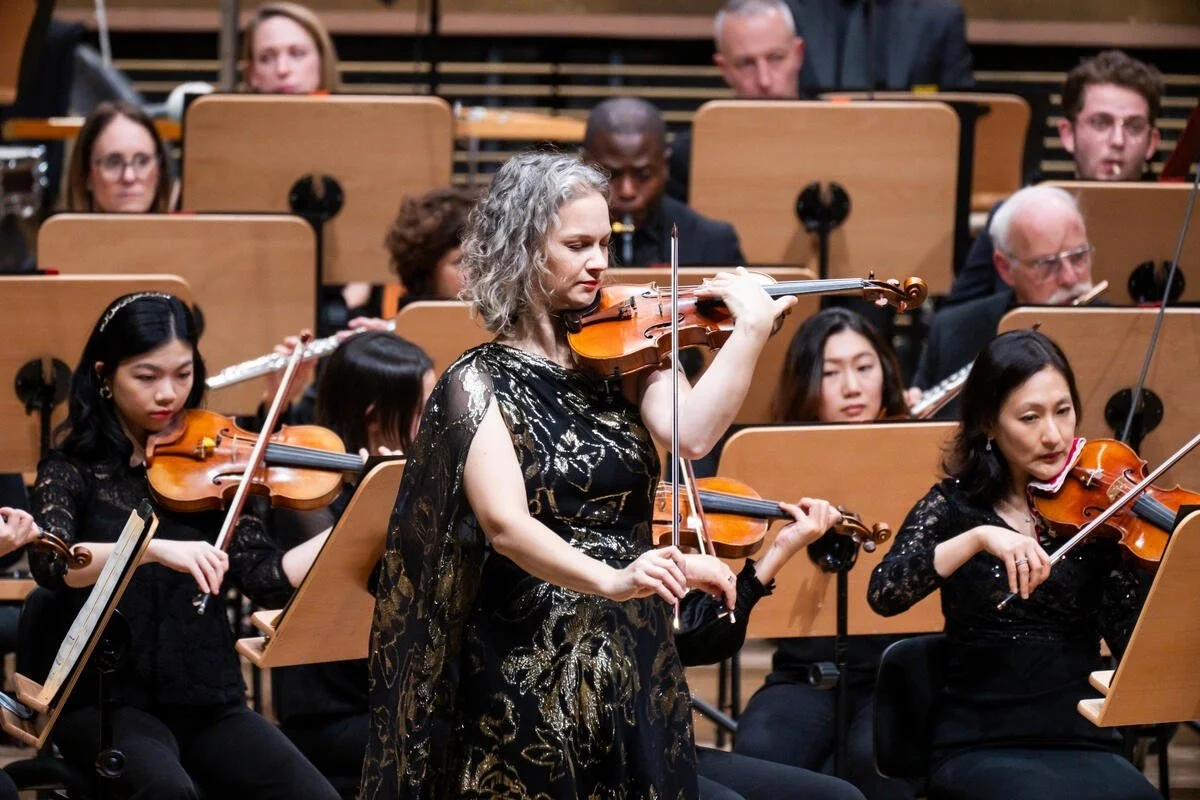REVIEW: Canellakis and Ott Dazzle at New York Philharmonic
Above, Karina Canellakis and Alice Sara Ott with New York Philharmonic. Photo by Erin Baiano
April 6, 2024
Karina Canellakis, in her New York Philharmonic debut, conducted a heady, challenging program this past week at David Geffen Hall. If there was a unifying theme in the four works, it might have been a Rashomon-like exploration of the various paths Western music took from the beginning of the Fin de Siècle to the Roaring Twenties.
Anton Webern’s Six Pieces for Orchestra, Op. 6b from 1909 (revised in 1928) was a dry-as-bones aperitif — a clarifying warm-up to hear the nooks and crannies of the orchestra in close-up display. Native New Yorker, now internationally in-demand conductor, Canellakis — with matter-of-fact, yet warm, bedside manner — demonstrated a clinical, studied baton technique, as if animating the simple illustrations in Brock McElheran’s venerable textbook Conducting Technique.
Studied, yet not cold. Yes, you could trace the dynamics of the composer’s markings — here’s a sforzando; now we’re pianissimo — in the elegant choreography of Canallakis’s ictus. But, in the following work, Richard Strauss’s tone poem Tod und Verklärung (Death and Transfiguration), Op. 24 from 1889, conductor and orchestra did not demure from the other side of the Viennese coin — layered, soaring, long lines. Maximal expression. Canallakis, impressively in command, deliberately sculpted the symphonic mountain climb into an emotionally piquant drama.
Also making her NY Phil debut, German-Japanese pianist Alice Sara Ott dazzled in Maurice Ravel’s Piano Concerto in G Major, vividly embodying the work’s Mozart-meets-Gershwin spirit. The first movement, Allegramente, was swift — the swooning trills of the cadenza flew by with precious little operatic indulgence, and the subsequent, motoric build to the snapping final cadence nearly went off the rails.
Photo by Erin Baiano.
Ott brought a special artistry to the exquisite Adagio assai; she maintained an intimate pianissimo, almost whispered, requiring the rapt audience to lean in. The Presto was rollicking — the perfect antidote to Webern and Strauss, smiling and winking where they furrow and frown. The orchestra assailed the tricky score with style, especially the perky trumpet playing of Christopher Martin and the luxuriant English Horn lyricism of Ryan Roberts.
Ott’s encore of Arvo Pärt’s Für Alina — which she recorded on her recent album Echoes of Life — offered the polar opposite of the rest of the program: a bare minimum of notes. Barefoot and exuding a lack of pretense, Ott is a maverick who understands the communal aspect of music making, actively including not only the other musicians on stage, but also the audience (turning to face the house more than most soloists), as participants in the performance.
Alexander Scriabin’s Le Poème de l’extase, Op. 54, is like the climax of Götterdämmerung all the way through, but Canellakis managed to keep the Philharmonic focused and tight. If this talented conductor didn’t necessarily make a convincing case for Scriabin’s hallucinogenic dive into delayed gratification as more than expressionist novelty, she proved the case for her potential for greatness on the podium.
Photo by Erin Baiano.







